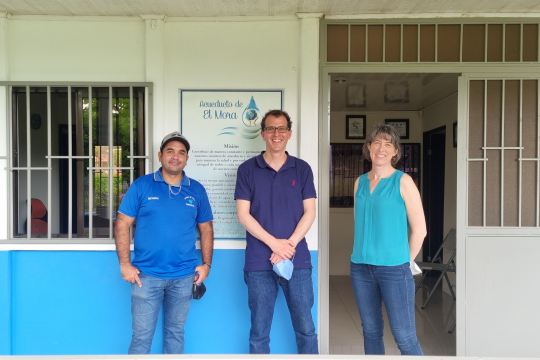Tanya Hayes and Felipe Murtinho, researchers from Seattle University, visited EfD Central America to identify opportunities for developing high-quality research proposals related to the Sustainable Development Goal 6 (SDG6), which aims to ensure access to water and sanitation for all.
"Clean water is a human right," said Tanya Hayes.
"Changing climatic conditions make it all the more important to understand how we can provide consistent access to clean water as droughts and flooding threaten both the quantity and quality of water available to local communities," she added.
Roger Madrigal, EfD Central America Director, mentioned that the topic of water community organizations (WCO) is relevant when you discuss SDG6 because the WCOs are at the forefront when it comes to climate change adaptation.
Learning from local leaders
During their visit to Costa Rica, Felipe Murtinho and Tanya Hayes visited with the junior researcher, Anthony Gamboa, the WCO located in the El Mora neighborhood. The researchers had the opportunity to learn about real research priorities from the local leader's perspectives.
"The meeting with the water administrator for the WCO El Mora provided a great introduction into the diversity of water management arrangements and some of the challenges these WCOs currently face providing consistent access to quality water," said Felipe Murtinho.
The researchers received information about recent efforts done by the WCO such as organizing themselves into second level organizations to address some of the challenges, through training and better pricing to cover needed equipment.
Research interests and experience
Felipe Murtihno is the Director of the International Studies Program at Seattle University, and Tanya Hayes holds a joint appointment with the Institute of Public Service and the Environmental Studies Program, also at Seattle University.
They have studied the factors that motivate individuals to come together to collectively manage their natural resources systems.
"Most recently, we have been looking at how payment for environmental service programs motivates communities to conserve their watersheds and high-altitude grasslands," said Tanya Hayes.
Felipe Murtihno previously worked on community water management in Colombia. His experience in that country has increased his interest to explore and compare how community water management works in Costa Rica.
Networking
The visit of these two researchers was very valuable for EfD Central America, not only to explore opportunities for collaborative research projects and proposals but also to strengthen networking and contribute to solving some of the environmental and development issues affecting the Global South, especially related to the SDG6.
Written by: Marianela Argüello L.
